David Nielsen
| Department | Climate Variability |
| Group | Ocean Biogeochemistry |
| Position | Postdoc |
| phone | +49 |
| david.nielsen@mpimet.mpg.de | |
| Room | G 344 |
I am broadly interested in climate variability and change. I work with models of varying complexity, from simple empirical models, to global ocean and Earth system models, form daily to centennial time scales. Topic-wise, I have worked on the ocean carbon cycle and its physical boundaries, especially in polar and coastal regions, and previously on the predictability of the South American monsoon. Currently, I am working on assessing the impact of increasing resolution (up to a couple of kilometers horizontally) in global models.
I have a background in Environmental (BSc) and Biosystems Engineering (MSc), and Earth System Science (PhD). Thesis: "An Earth system modelling perspective on Arctic coastal erosion under climate change" [Thesis PDF]
Postdoc, Max Planck Institute for Meteorology, Ocean Biogeochemistry group, Hamburg, Germany (2022 - present)
PhD Earth System Sciences (summa cum laude), Universität Hamburg and International Max Planck Research School on Earth System Modelling, Hamburg, Germany (2018 - 2021)
Lena Delta Expedition to Samoylov and Mustakh Islands, Russia (summer 2019).
MSc Biosystems Engineering, Universidade Federal Fluminense, Niterói, Brazil (2016 - 2018)
Internship, LOCEAN, Sorbonne Universités, Paris, France (summer 2018)
Environmental Engineering, Universidade Federal Fluminense, Niterói, Brazil (2010 - 2016)
Exchange year and thesis in BSc Earth Science, VU Amsterdam, Netherlands (2013 - 2014)
Visagio Management Consulting, Rio de Janeiro, Brazil (Intern 2012 - 2013, Trainee 2014 - 2015)
CLICCS A5: The Land-Ocean Transition Zone
CLICCS A1: Carbon Dynamics in the Arctic
CLICCS A6: Earth System Variability and Predictability
EU Horizon 2020 Nunataryuk: Coastal permafrost research, combining modelling and socio-economic analysis, from local communities to the pan-Arctic scale.
Submitted and in review
Nielsen DM, Chegini F, Serra N, Kumar A, N. Brüggemann, C. Hohenegger and Ilyina T. Resolved tropical cyclones trigger CO2 uptake and phytoplankton bloom in an Earth system model simulation (submitted). PREPRINT: https://doi.org/10.31223/X5KF05
Mathis M, Nielsen DM, Hagemann S, Ilyina T and Schrum C. Arctic Ocean acidification and carbonate undersaturation enhanced by coastal permafrost erosion (submited).
Published
Gartler S, Scheer J, Meyer A et al. (incl. Nielsen DM). (2025) A transdisciplinary, comparative analysis reveals key risks from Arctic permafrost thaw, Communications Earth & Environment, https://doi.org/10.1038/s43247-024-01883-w
Creel R, Guimond J, Jones B, Nielsen DM, Bristol EM, Tweedie CE and Overduin PP (2024). Permafrost thaw subsidence, sea-level rise and erosion are reshaping Arctic Alaska's coastal zone, PNAS, https://doi.org/10.1073/pnas.2409411121
Burn C et al. (incl. Nielsen DM). (2024) Developments in permafrost science and engineering in response to climate warming in circumpolar and high mountain regions, 2019–2024. Permafrost and Periglacial Processes, Review Article, https://doi.org/10.1002/ppp.2261
Nielsen DM, Chegini F, Maerz J, Brune S, Mathis M, Brovkin V, Baehr J, Dobrynin M and Ilyina T. (2024) Reduced Arctic Ocean's CO2 uptake due to coastal permafrost erosion. Nature Climate Change, https://www.nature.com/articles/s41558-024-02074-3
Mathis M, Lacroix F, Hagemann S, Nielsen DM, Ilyina T, Schrum C. (2024) Increasing atmospheric CO2 enhances the carbon uptake of coastal ocean. Nature Climate Change, https://doi.org/10.1038/s41558-024-01956-w
Barkhordarian A, Nielsen DM, Olonscheck D. and Baehr J. (2024) Greenhouse gas-induced Arctic marine heatwaves triggered by abrupt sea ice melt. Communications Earth & Environment, https://doi.org/10.1038/s43247-024-01215-y
Nielsen DM, Pieper P, Barkhordarian A, Overduin PP, Ilyina T, Brovkin V, Baehr J and Dobrynin M. (2022) Increase in Arctic coastal erosion and its sensitivity to warming in the twenty-first century, Nature Climate Change, https://doi.org/10.1038/s41558-022-01281-0
Barkhordarian A, Nielsen DM, and Baehr J. (2022) Recent marine heatwaves in the North Pacific warming pool can be attributed to rising atmospheric levels of greenhouse gases. Communications Earth & Environment, https://doi.org/10.1038/s43247-022-00461-2
Brune S, Espejo MC, Nielsen DM, Hongmei L, Ilyina T and Baehr J. (2021) Oceanic Rossby waves drive inter-annual predictability of net primary production in the central tropical Pacific. Environmental Research Letters, https://doi.org/10.1088/1748-9326/ac43e1
Nielsen DM, Dobrynin M, Baehr J, Razumov S and Grigoriev M. (2020) Coastal erosion variability at the southern Laptev Sea linked to winter sea ice and the Arctic Oscillation, Geophysical Research Letters, https://doi.org/10.1029/2019GL086876
Nielsen DM, Belém AL, Marton E. and Cataldi, M. (2019) Dynamics-based regression models for the South Atlantic Convergence Zone. Climate Dynamics, https://doi.org/10.1007/s00382-018-4460-4
Nielsen DM, Cataldi M, Belém AL and Albuquerque ALS. (2016) Local indices for the South American monsoon system and its impacts on Southeast Brazilian precipitation pattern, Natural Hazards, https://doi.org/10.1007/s11069-016-2355-4
Non-peer reviewed
Nielsen DM (2022) An Earth system modelling perspective on Arctic coastal erosion under climate change. PhD Thesis, Universität Hamburg, Hamburg. [PhD Thesis PDF]
Nielsen DM et al. (2022) Arctic coastal erosion accelerates permafrost carbon loss - uncertainties and impacts. Behind the Paper, Springer-Nature Sustainability Community. https://go.nature.com/34fl2p5
Nielsen DM (2018) Objective identification of the South Atlantic Convergence Zone in variables of the atmospheric dynamics. Master's Thesis (in Portuguese), Universidade Federal Fluminense, Niterói. [Master's thesis PDF]
Reviewer for Geophysical Research Letters, Communications Earth & Environment, Global Biogeochemical Cycles, Theoretical and Applied Climatology, Scientific Reports, Frontiers in Earth Science, Geology, and the Hamburg Climate Futures Outlook.
Highlights
Preprint: Resolved tropical cyclones trigger CO2 uptake and phytoplankton bloom in an Earth system model simulation
The ocean carbon cycle is directly impacted by storms in the atmosphere. Tropical cyclones (TCs), particularly, are known to drive intense...
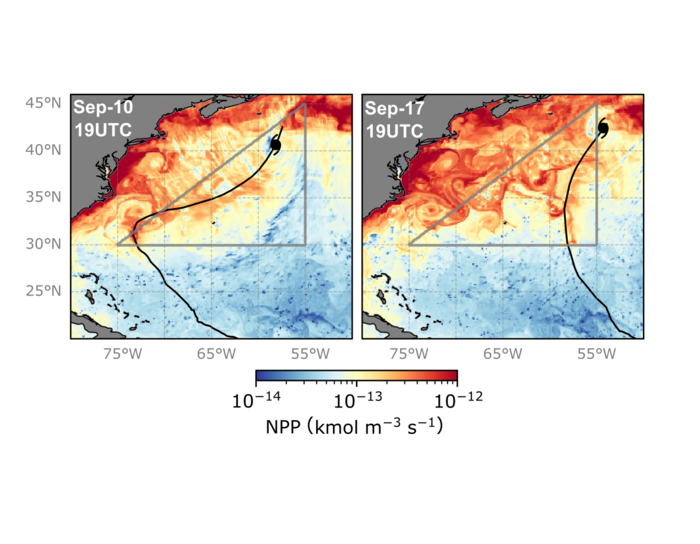

High-resolution Earth system modelling
In this video we visualize two months (August and September) of simulations of the Earth's climate performed with the coupled model ICON. In this coupled setup, ICON represents interactions between ocean and atmosphere...
We are on the cover!
Digital illustration by artist Jenni Schurr highlights our article on the cover of Nature Climate Change (September 2024), depicting the coastal Arctic landscape of Muostakh Island, Laptev Sea.
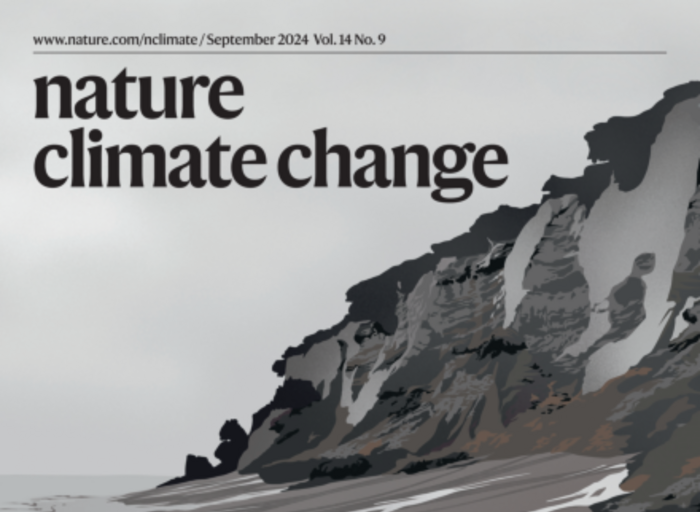
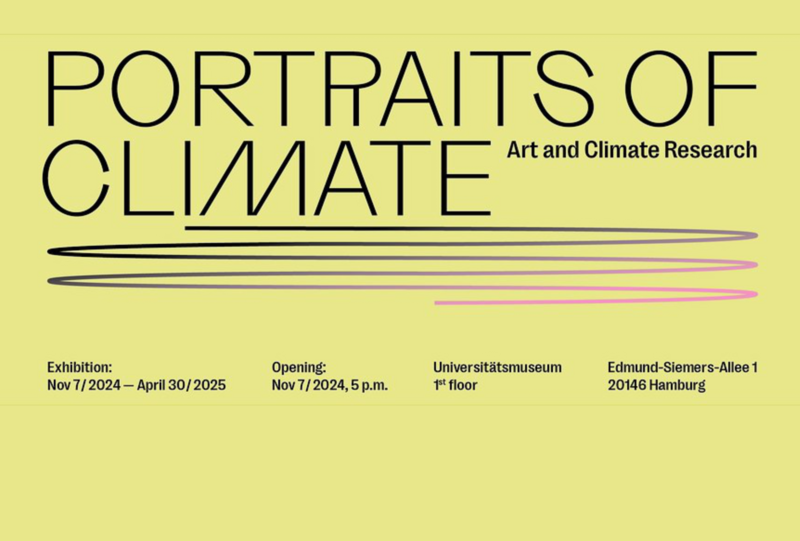
In "Portraits of Climate" we unite art and science in a unique collaborative endeavor. Over several months, artists and researchers exchange ideas and explore collaboration beyond their usual field of action...
Reduced Arctic Ocean CO2 uptake due to coastal permafrost erosion
Arctic coastal permafrost erosion is projected to increase by a factor of 2-3 by 2100. However, organic matter (OM) fluxes from the coastal permafrost into the ocean have not been considered in Earth system models (ESMs) so far. Here, we represent coastal permafrost erosion in an ESM...
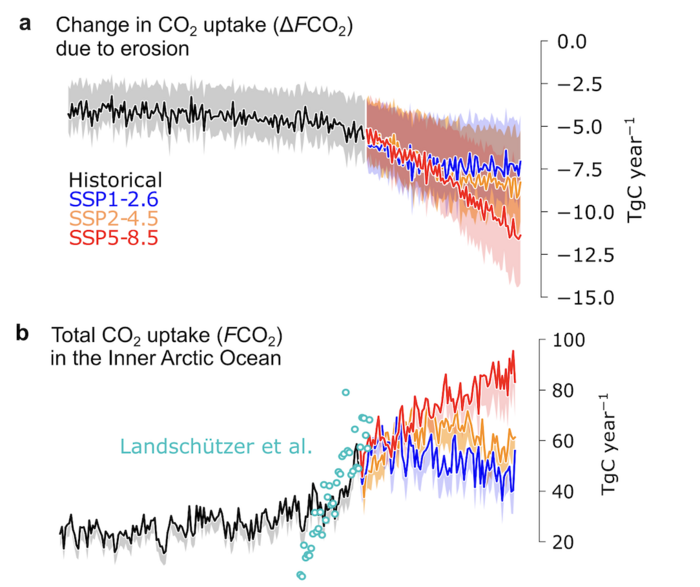
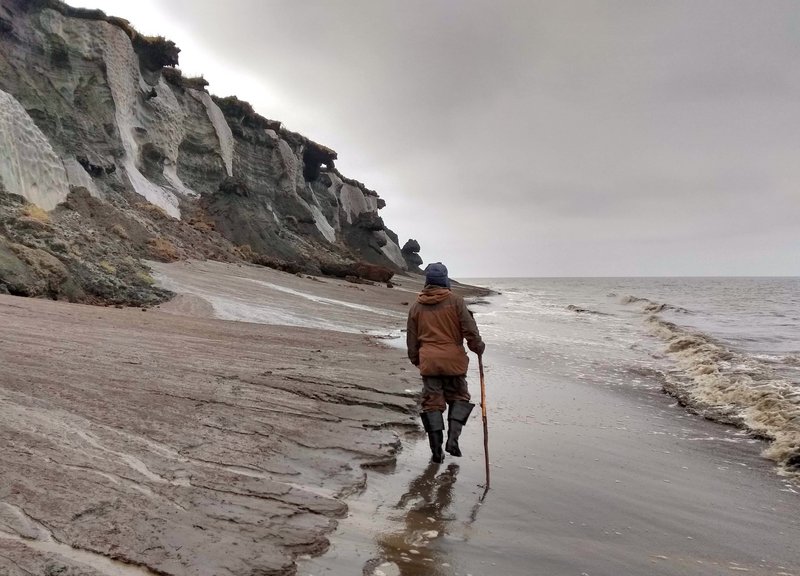
Modelling future Arctic coastal erosion
The Arctic coast consists of permafrost – perennially frozen ground – very rich in organic carbon and ground ice. During winter, coastal permafrost is well protected, surrounded by sea ice...
